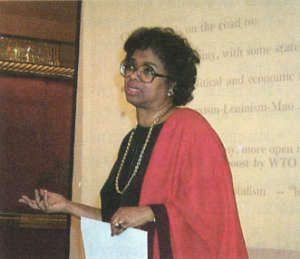 China’s challenges were center stage at IDRC’s record-breaking March 27-28 Beijing World Congress, “Asia and Corporate Real Estate: Global Infrastructure Rises to the Next Level,” which drew an Asian record turnout of 172. “This Congress was a marker in China’s future development,” said presenter Marcel De Meirleir of Ernst & Young.
China’s challenges were center stage at IDRC’s record-breaking March 27-28 Beijing World Congress, “Asia and Corporate Real Estate: Global Infrastructure Rises to the Next Level,” which drew an Asian record turnout of 172. “This Congress was a marker in China’s future development,” said presenter Marcel De Meirleir of Ernst & Young.
RIGHT: Lois Dougan Tretiak of The Economist Conferences’ Business China Group
discussed China and the WTO.
“[Asian] real estate strategies have produced outstanding corporate benefits, and new technology has enabled quantum leaps in flexibility and global mobility,” explained Woods Bagot’s Leonie Lorrimer.
But the “Asian Flu’s” aftermath promises more challenges, noted keynoter Seek Ngee Huat, president of GIC Real Estate, Singapore’s investment corporation: “Some regional economies are changing radically, [with] lasting implications for multinationals and real estate practices.”
Technology investments are a key strategic weapon in China, explained Motorola’s Ed Lewis. China’s largest U.S. investor, committing $1.5 billion-plus by yearend 1999, Motorola has set up 20-plus Chinese branch offices, a wholly owned venture in Tianjin and six equity joint ventures.
“The conference made it clear that we all need to understand and embrace the coming technology,” commented Maurice Pitard of DTZ Debenham Tie Leung.
“Everything discussed was real-world, practical and appealed to the Asian audience,” Exxon/Mobil’s Cliff Pearson said of the balance between regional and macro content. “This sets a very solid foundation for future Asian World Congresses and will stimulate IDRC’s Asian membership.”

